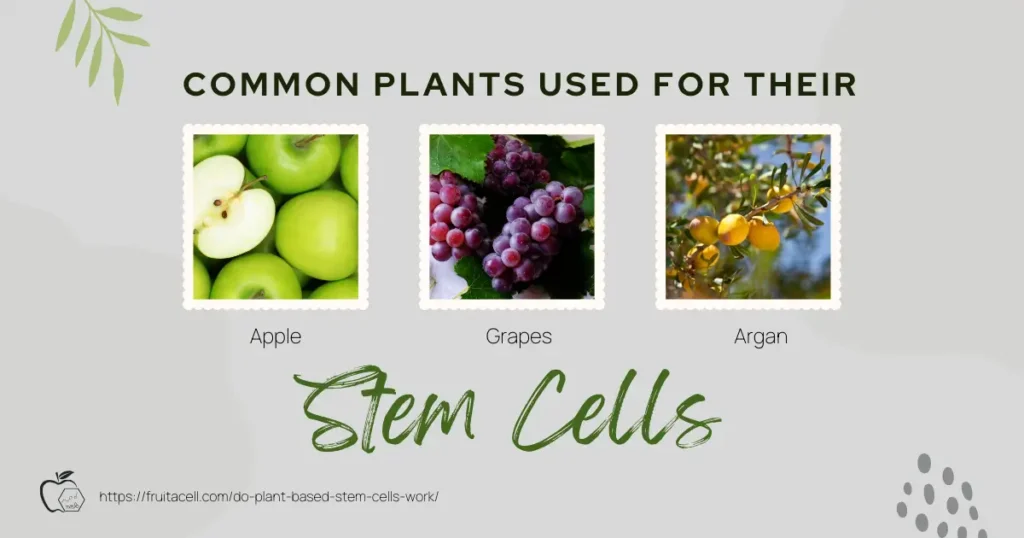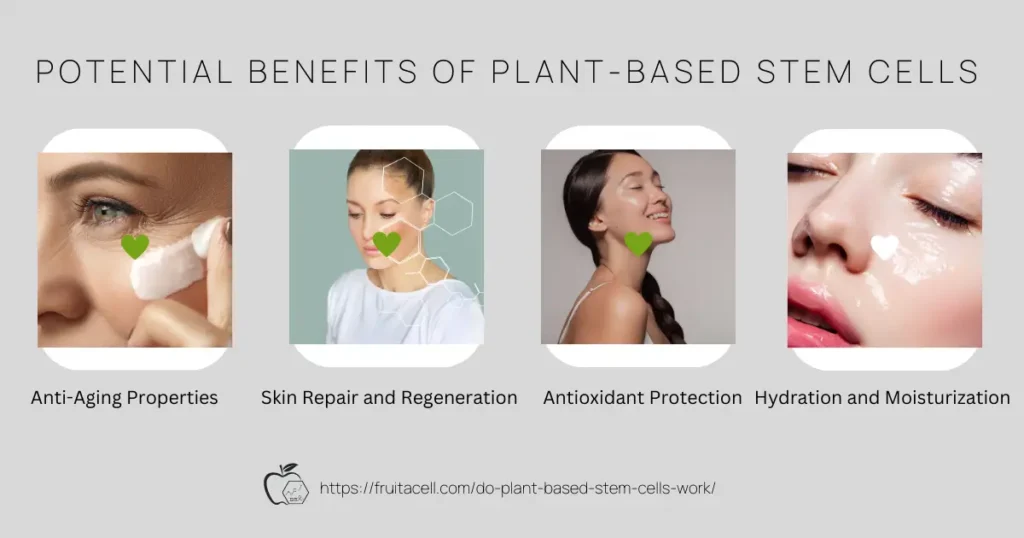Your cart is currently empty!
Do Plant-Based Stem Cells Work?
—
In recent years, there’s been a lot of buzz around plant-based stem cells, especially in the world of skincare and natural health.
But what exactly are these plant-based stem cells, and do they work as well as some claim?
With so many products and opinions out there, it can be hard to know what to believe.
This article explains what plant-based stem cells are, their uses, and the evidence supporting their benefits, helping you understand their potential and limitations for skincare and health.
What Are Plant-Based Stem Cells?
To understand plant-based stem cells, let’s start with the basics: what are stem cells?
Stem cells are special cells that have the ability to develop into different types of cells.
National Institutes of Health
In humans, stem cells play a crucial role in our bodies’ growth, repair, and maintenance.
Now, plant-based stem cells come from plants. Like humans, plants have stem cells that help them grow and heal.
These cells are found in the growing tips of roots and shoots and in other parts of the plant where new growth happens.

What’s interesting about plant-based stem cells is how they’re being used in products, particularly in skincare.
Scientists can extract these cells from plants and use them to create ingredients that are believed to have rejuvenating and protective properties.
How Are Plant-Based Stem Cells Used?
Plant-based stem cells have found their way into a variety of products, especially in the beauty and wellness industries.
Let’s take a closer look at how they are used and why they have become so popular.
Skincare and Cosmetics
One of the most common uses of plant-based stem cells is in skincare products. You’ll find them in creams, serums, lotions, and masks.
The idea is that these stem cells can help to rejuvenate the skin, reduce signs of aging, and repair damage caused by environmental factors like sun exposure and pollution.
Here’s how it typically works: the stem cells are extracted from plants and then incorporated into skincare formulas.
These products claim to deliver benefits such as:
- Anti-aging: Reducing the appearance of wrinkles and fine lines.
- Skin Repair: Helping to heal and regenerate damaged skin.
- Protection: Offering antioxidant properties that protect the skin from harmful free radicals.

Other Potential Uses
While skincare is the most popular application, plant-based stem cells are also being explored for other health and wellness purposes.
Some supplements and health products include plant stem cells to promote overall well-being, though this is a newer and less studied area.
Popular Products
Many beauty brands have jumped on the plant-based stem cell bandwagon, creating a variety of products. For example:
- Apple Stem Cell Creams: These often claim to promote youthful skin by boosting cell renewal.
- Grape Stem Cell Serums: Known for their antioxidant properties, these products aim to protect and repair the skin.
- Argan Stem Cell Masks: These masks often promise deep hydration and skin regeneration.
These products can be found in both high-end boutiques and more affordable drugstore brands, making them accessible to a wide range of consumers.
Potential Benefits of Plant-Based Stem Cells
So, what makes plant-based stem cells so appealing?
Let’s explore the potential benefits that are often highlighted by manufacturers and proponents.
Anti-Aging Properties
One of the biggest claims about plant-based stem cells is their ability to combat signs of aging.
It’s believed that these cells can:
- Stimulate Skin Renewal: By encouraging the growth of new skin cells, plant-based stem cells may help to reduce the appearance of wrinkles and fine lines.
- Boost Collagen Production: Collagen is a protein that keeps skin firm and elastic. Some studies suggest that plant-based stem cells can help increase collagen levels, leading to firmer, more youthful-looking skin.
Skin Repair and Regeneration
Another touted benefit is the ability of plant-based stem cells to repair and regenerate damaged skin.
This includes:
- Healing: They may promote faster healing of minor cuts, burns, or blemishes.
- Regeneration: By supporting the skin’s natural repair processes, they might help to improve skin texture and tone over time.
Antioxidant Protection
Many plant-based stem cells are rich in antioxidants.
These powerful compounds can:
- Protect Against Free Radicals: Free radicals are unstable molecules that can damage cells and accelerate aging. Antioxidants neutralize these molecules, protecting the skin from harm.
- Reduce Inflammation: Antioxidants also have anti-inflammatory properties, which can help to soothe irritated or inflamed skin.
Hydration and Moisturization
Some plant-based stem cells are known for their hydrating properties.
For example:
- Moisture Retention: They can help the skin retain moisture, keeping it plump and hydrated.
- Barrier Function: By strengthening the skin’s natural barrier, they can prevent moisture loss and protect against external irritants.

Scientific Support
While many of these benefits are promising, it’s important to note that the scientific evidence is still emerging.
Some studies have shown positive results, but more research is needed to fully understand the effectiveness of plant-based stem cells in skincare and health products.
Limitations and Criticisms
While plant-based stem cells hold promise, it’s essential to acknowledge their limitations and address criticisms that have been raised about their use.
Here are some key points to consider:
1. Limited Scientific Evidence
One of the main criticisms of plant-based stem cells is the lack of extensive scientific evidence supporting their efficacy.
While some studies have shown promising results, many of these have been conducted by the companies producing the products, raising questions about potential bias.
2. Complexity of Skin Penetration
Another challenge is the ability of plant-based stem cells to penetrate the skin effectively.
The skin is a highly efficient barrier, and it’s not always clear whether the active ingredients in skincare products, including plant-based stem cells, can reach the deeper layers where they’re needed to have an impact.
3. Exaggerated Marketing Claims
In the competitive world of skincare, marketing claims can sometimes be exaggerated or misleading.
Some products may promise dramatic results that are not backed up by scientific evidence.
It’s important for consumers to approach these claims with a critical eye and to look for products with transparent labeling and honest marketing.
4. Regulatory Concerns
The regulatory landscape for plant-based stem cell products is still evolving. In many cases, these products fall into a regulatory gray area, making it challenging for consumers to know whether they’re safe and effective.
Without clear regulations in place, there’s a risk of substandard products entering the market.
5. Ethical Considerations
There are also ethical considerations surrounding the use of plant-based stem cells. While plants don’t have the same ethical considerations as animals, there are still questions about sustainability and environmental impact.
Additionally, some critics argue that using plant stem cells for cosmetic purposes diverts resources away from more pressing issues, such as food security and agricultural sustainability.
Personal Stories and Testimonials
In addition to expert opinions and scientific research, personal stories and testimonials can provide valuable insights into the effectiveness of plant-based stem cell products.
Let’s explore some anecdotes from individuals who have used these products:
Positive Experiences
Many people report positive results after incorporating plant-based stem cell products into their skincare routines.
These individuals often cite improvements in skin texture, tone, and overall appearance.
Some claim to have experienced a reduction in fine lines and wrinkles, as well as increased hydration and radiance.
Case Studies
In some cases, skincare brands may share case studies or before-and-after photos showcasing the effects of their plant-based stem cell products.
While these examples can be compelling, it’s essential to approach them with a critical eye and consider factors such as lighting, angle, and potential retouching.
Varied Responses
It’s important to note that not everyone experiences the same results with plant-based stem cell products.
Skincare is highly individual, and factors such as skin type, age, lifestyle, and genetics can influence how well a product works for a particular person.
Some individuals may see significant improvements, while others may notice minimal or no change.
Safety and Side Effects
When considering any skincare product, including those containing plant-based stem cells, it’s essential to prioritize safety and be aware of potential side effects, both for topical and internal use as dietary supplements.
Topical Use
- Plant-based stem cell products are generally safe for topical use when produced by reputable companies and used as directed.
- Ingredients are derived from natural sources, minimizing the risk of harm to the skin.
- However, allergic reactions can occur, especially for those with sensitive skin or allergies to specific plant extracts.
- Patch-testing new products before widespread use is essential, with discontinuation in case of irritation.
- Some plant-based ingredients, like citrus extracts, can increase skin sensitivity to sunlight.
- Regular sunscreen application and sun protection measures are necessary when using such products.
Internal Use as Dietary Supplements
- Consult with a Healthcare Professional:
- Before starting any new plant-based stem cell supplements, especially if you’re planning to use them internally, it’s important to talk to a healthcare professional.
- They can give you advice tailored to your health, medical history, and any medications you’re taking.
- Possible Interactions and Side Effects:
- While many people can tolerate plant-based supplements well, they might interact with your medications or other supplements.
- Some folks might experience upset stomachs, allergies, or problems if they have certain health conditions.
- Pick High-Quality Supplements:
- Choose plant-based stem cell supplements from well-known brands that make sure their products are safe and pure.
- Look for ones that have been tested for safety and effectiveness and meet the standards for dietary supplements.
Conclusion
Plant-based stem cells have garnered attention for their potential benefits in skincare and wellness.
While they offer promising possibilities, it’s crucial to approach them with a balanced perspective, considering both the available evidence and individual experiences.
References
- Gomaa, Iman. “Plant Stem Cells: The Next Generation of Skincare.” Dermatology Times, 22 Nov. 2019, www.dermatologytimes.com/view/plant-stem-cells-next-generation-skincare.
- Lintner, Karl. “Plant Stem Cells for Cosmetic Applications.” International Journal of Cosmetic Science, vol. 34, no. 6, 2012, pp. 551-557.
- Park, Hyunmin et al. “Skin Anti-Inflammatory Activity of Rose Stem Cell Extracts.” International Journal of Molecular Sciences, vol. 19, no. 4, 2018, p. 1012.
- Saggers, Jessica. “Exploring the Use of Plant Stem Cells in Skincare.” Cosmetic Design, 15 July 2020, www.cosmeticsdesign-europe.com/Article/2020/07/15/Exploring-the-use-of-plant-stem-cells-in-skincare.
- Smith, Lauren. “The Truth About Plant Stem Cell Skincare.” Harper’s Bazaar, 20 Oct. 2021, www.harpersbazaar.com/beauty/skin-care/a25108318/plant-stem-cell-skincare-benefits.
- Wang, Han et al. “Plant Stem Cells: An Emerging Field in Skin Biology and Regenerative Medicine.” Journal of Cosmetic Dermatology, vol. 17, no. 4, 2018, pp. 507-514.
- Klettner, Alexa et al. “Plant Stem Cell Extracts in Skin Care Products: Current Trends and Challenges.” Cosmetics, vol. 4, no. 3, 2017, p. 46.
- Sivakumar, Ganesh et al. “Plant Stem Cell Extracts in Cosmetics: Current Scenario and Future Directions.” Biotechnology Reports, vol. 31, 2021, e00632.
- Baek, Sun Young et al. “Phytochemicals and Antioxidant Properties of Solvent Extracts from Angelica gigas Nakai Leaves Using Ultrasound-Assisted Extraction.” Journal of the Korean Society of Food Science and Nutrition, vol. 46, no. 3, 2017, pp. 318-325.
- Lee, Sang-Hyun et al. “Activation of Nrf2/HO-1 Signaling by Ginsenoside Rh2 Attenuates Ultraviolet B-Induced Photoaging in Human Keratinocytes.” Nutrients, vol. 13, no. 6, 2021, p. 1942.
- Cheng, Chang-Mu et al. “Exploring the Potential of Quercetin and Its Derivatives in Skin Therapy.” Molecules, vol. 26, no. 4, 2021, p. 1003.
Disclaimer
The information provided in this article is for educational and informational purposes only. It is not intended as medical advice or to replace the advice of a qualified healthcare professional. Readers should consult with a healthcare provider before making any decisions about their skincare, wellness, or dietary supplement regimens.
Leave a Reply